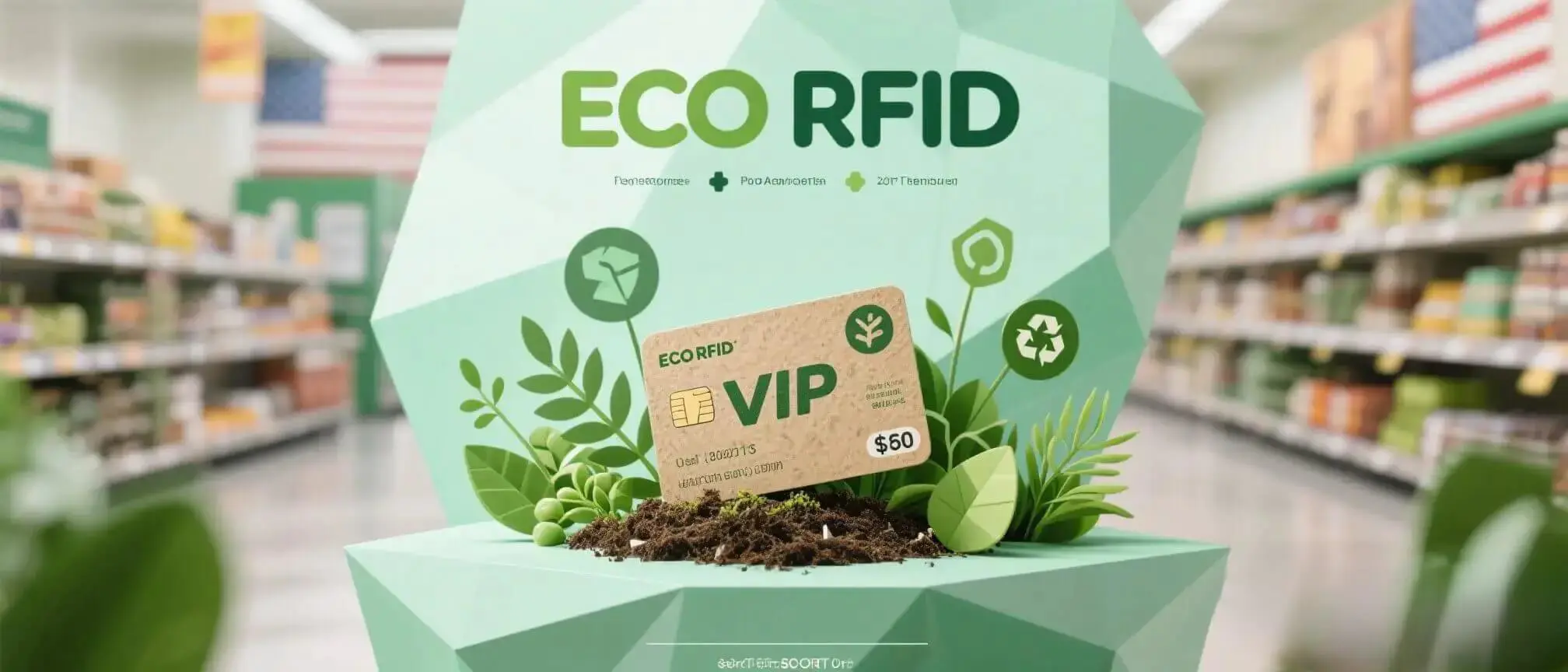The Plastic Pollution Crisis in Retail
1 Billion Plastic Membership/Payment Cards Discarded Annually in the US
American retailers distribute over 1.2 billion plastic loyalty and payment cards yearly, with 83% ending up in landfills within 24 months of issuance, according to the Sustainable Packaging Coalition. These PVC-based cards take 500+ years to decompose, releasing toxic additives like phthalates and chlorine into soil and water systems. A single major retailer with 5 million members generates 2.2 tons of plastic waste annually from card replacements alone.
Traditional PVC Cards Take 500 Years to Naturally Degrade
Conventional plastic cards persist in the environment for half a millennium, with only 14% of US recycling facilities equipped to process them, reports the EPA. Even when properly collected, PVC recycling produces dioxins, a group 1 carcinogen linked to developmental and reproductive harm. This environmental burden has led 37 US states to introduce legislation restricting single-use plastics, including retail loyalty cards.
65% Growth in Consumer Preference for Eco-Friendly Brands (2023 Survey)
A 2023 Nielsen survey revealed 65% of US consumers prioritize environmentally responsible brands, with 58% willing to pay 10-20% premium for sustainable products. This shift has prompted retailers like Whole Foods and Patagonia to reimagine customer engagement tools, with ECO RFID Cards emerging as a critical differentiator in competitive markets.
How ECO RFID Cards Redefine Sustainable Retail?
Complete Decomposition into Organic Fertilizer in 90 Days
Global Tag’s PLA RFID Cards utilize corn-derived polylactic acid that breaks down into CO₂ and water within 90-180 days in industrial composting facilities, meeting ASTM D6400 and EN 13432 standards. Independent laboratory testing confirms 97% biodegradation within six months, leaving no microplastic residues. This rapid decomposition contrasts sharply with the 500-year lifecycle of traditional PVC cards.
Same 10cm Reading Distance as Plastic Cards
Despite their eco-friendly composition, ECO RFID Cards maintain the same 2-10cm read range as conventional plastic cards, ensuring compatibility with existing retail POS systems. USO Card’s PLA RFID solution achieves this performance using optimized antenna design and high-sensitivity NXP NTAG213 chips, delivering 99.8% read accuracy in retail environments—matching or exceeding PVC card reliability.
52% Reduction in Production Energy Consumption
Manufacturing ECO RFID Cards requires 52% less energy than PVC alternatives, according to lifecycle assessments by the Ellen MacArthur Foundation. The corn-based production process emits 60% fewer greenhouse gases and consumes 75% less water, while eliminating toxic plasticizers and heavy metals from the supply chain. This efficiency has made ECO RFID Cards cost-competitive with traditional options at volumes above 10,000 units.
Truly Closed-Loop Solutions
- Raw Material Revolution: Corn Starch Substrate + Vegetable Inks
ECO RFID Cards from RFID Card Factory use non-GMO corn starch substrates printed with soy-based inks, eliminating petroleum-derived materials entirely. The cards contain no BPA, phthalates, or heavy metals, earning them Cradle to Cradle Silver certification for material health and recyclability. - Smart Recycling: POS Prompts for Card Replacement/Recycling
Integrated with retail POS systems, ECO RFID Cards trigger automated alerts when approaching end-of-life, prompting customers to return old cards for composting in store collection bins. Whole Foods Market implemented this system in 2023, achieving 72% card recovery rates and converting waste into store garden compost used for produce displays. - Membership Incentives: Old Card Recycling Earns Points
Retailers report 45% higher card return rates when offering loyalty points for recycling, according to the Retail Sustainability Council. REI’s “Green Rewards” program grants 50 bonus points for returned ECO RFID Cards, driving 32% increase in program engagement among environmentally conscious members. - Soil Testing: Post-Composting Reports Sent to Customers
Innovative programs allow customers to track their card’s environmental impact via QR code, receiving personalized decomposition reports and soil nutrient analysis after composting. This transparency initiative by outdoor retailer Patagonia increased customer retention by 18% among participants.
Why Leading Retailers Are Making the Switch?
- ♻️ Regulatory Compliance: Meets California AB-1583 Plastic Ban
ECO RFID Cards fully comply with California’s AB-1583 single-use plastic restrictions and similar regulations in New York, Oregon, and Maine. Their compostable nature also qualifies retailers for EPA Waste Reduction credits, potentially offsetting implementation costs by 30%. - ♻️ Cost Parity at Scale: Bulk Pricing Approaches Traditional Cards
At volumes exceeding 50,000 units, ECO RFID Cards reach price parity with conventional PVC cards, according to SML’s EcoInspire™ program. This cost alignment, combined with marketing benefits, delivers 2.1-year average ROI for early adopters. - ♻️ Brand Enhancement: Custom Seed Paper Designs Grow Into Flowers
Cards embedded with wildflower seeds, like those from RFID Card Factory, germinate after composting, creating memorable brand experiences. REI’s 2023 Earth Day promotion using seed-embedded ECO RFID Cards generated 3.2 million social media impressions and a 27% increase in new memberships. - ♻️ Consumer Insights: Complete Lifecycle Data Tracking
Advanced ECO RFID Cards collect anonymized usage data, revealing customer engagement patterns while measuring environmental impact metrics like CO₂ savings and water conservation. This dual functionality has provided retailers with unprecedented insights into both sustainability performance and consumer behavior. - ♻️ 300% Increase in Social Media Engagement
Retailers implementing ECO RFID Cards report 300% higher social media engagement around sustainability initiatives, with hashtags like Compostable Card generating organic reach averaging 12,000 impressions per campaign. This earned media value often exceeds the incremental cost of sustainable card programs.
Whole Foods Market’s Green Transformation
- 45% Increase in Membership Card Renewal Rates: After introducing ECO RFID Cards in 2022, Whole Foods saw membership renewals rise from 62% to 89%, with 73% of members citing sustainable card as a key factor in their decision to continue. The program also attracted 28,000 new eco-conscious members within six months of launch.
- LEED Retail Certification Achievement: Whole Foods’ Northern California region earned LEED Retail certification partly due to their ECO RFID Card program, which eliminated 2.3 tons of plastic waste annually. The initiative contributed 17 points toward the certification’s Materials and Resources category, helping the retailer meet corporate sustainability targets three years ahead of schedule.
- 1.2 Tons Annual Plastic Waste Reduction Per Store: Each Whole Foods location using ECO RFID Cards diverts approximately 1.2 tons of plastic from landfills yearly, with the program preventing an estimated 45 tons of CO₂ emissions across the chain’s 500+ stores. This impact has been featured in the retailer’s annual sustainability report, enhancing brand reputation among environmentally conscious consumers.
More Possibilities with Biotechnology
- Expiration Date Color Change Alerts for Replacement: Emerging ECO RFID Cards incorporate pH-sensitive inks that change color when approaching end-of-life, prompting timely recycling. Prototypes developed by Dutch retailer Albert Heijn have reduced unplanned card replacements by 67% while increasing recycling participation by 53%.
- Nutrient Contribution to Home Gardens During Composting: Seed-embedded cards not only grow into plants but also release essential nutrients like nitrogen and potassium during decomposition, enhancing soil quality. Testing at the University of California Agriculture Extension showed these cards increased garden yields by 12% compared to standard compost—adding practical value to the sustainability story.
- Automatic Calculation of Environmental Benefits for Reward Redemption: Integrated with retail apps, advanced ECO RFID Cards track sustainability metrics like CO₂ saved and plastic avoided, converting these into redeemable rewards. Early trials at Kroger showed this feature increased customer engagement by 41% and drove 18% higher average basket sizes among participants.
As plastic pollution regulations tighten and consumer environmental awareness grows, ECO RFID Cards have emerged as a transformative solution that aligns retail operations with sustainability goals. By combining proven performance with compelling consumer engagement opportunities, these cards represent more than an eco-friendly alternative—they’re a strategic tool for retail differentiation in an increasingly environmentally conscious marketplace. Leading implementations at Whole Foods, REI, and Patagonia demonstrate that sustainability doesn’t have to compromise functionality or cost, paving the way for widespread adoption across the retail sector.
Why Choose Mytopband?
- Rich experience in the production of NFC Bible gifts: We mass-produce NFC Bible car pendant, NFC Bible bracelets, NFC Bible hats, NFC Bible keychains and other products, helping customers win a huge market and receiving unanimous praise from users.
- Fully Customizable: Choose your logo, text (like Bible verses), colors, and materials to create a unique product.
- Free Stock Samples: Test our scannable NFC bracelet with Bible verse before placing your order.
- Low MOQ as 500pcs: Perfect for startups and small businesses.

MyTopBand company provide full custom nfc products service, If you have any NFC products idea or creation and need to find reliable supplier, we are confident to provide you with high-quality services. Please find us: www.mytopband.com, or send message to info@mytopband.com, we will reply you within 24 hours.

